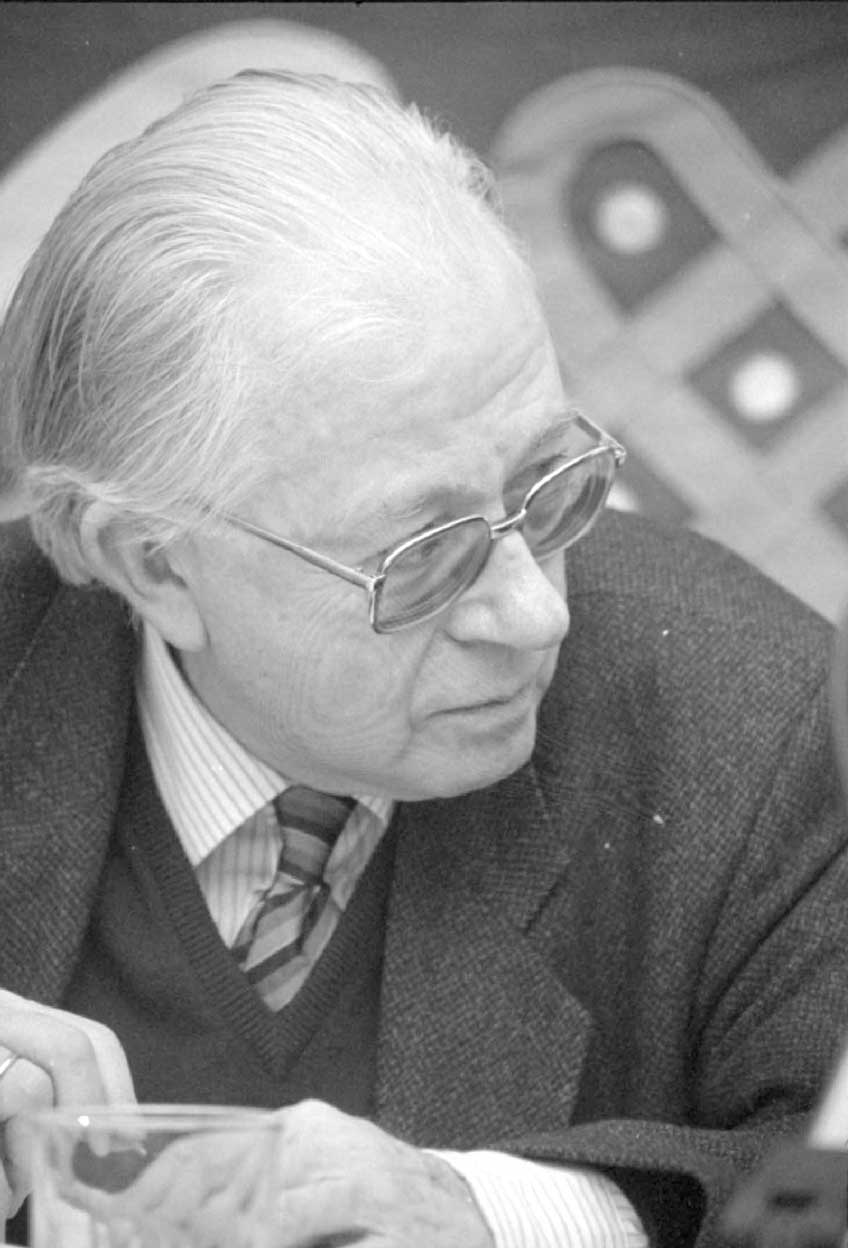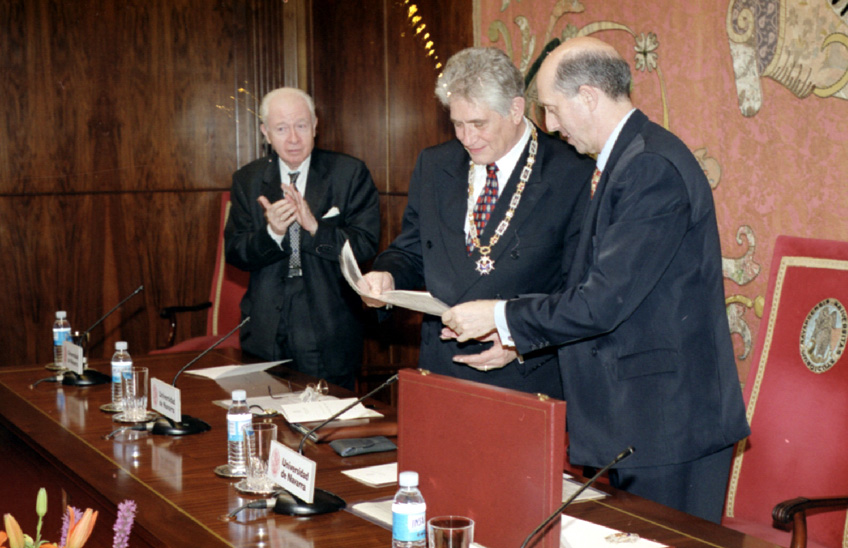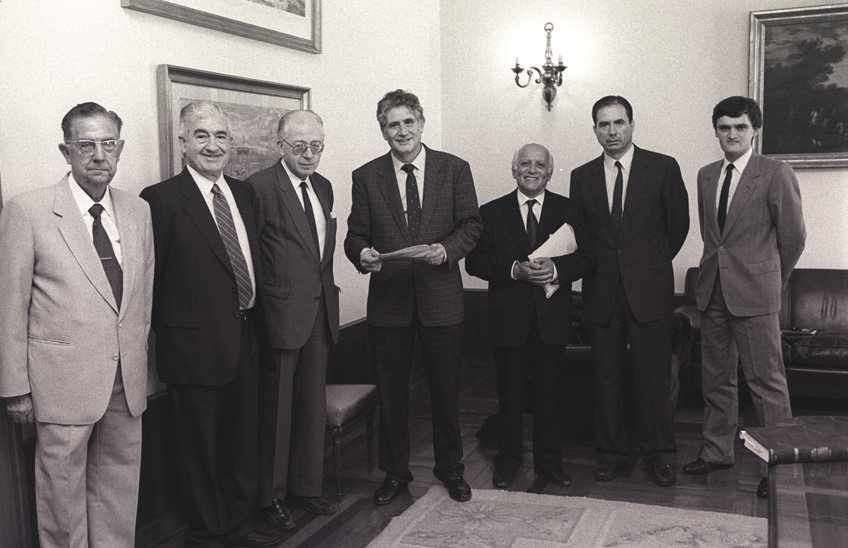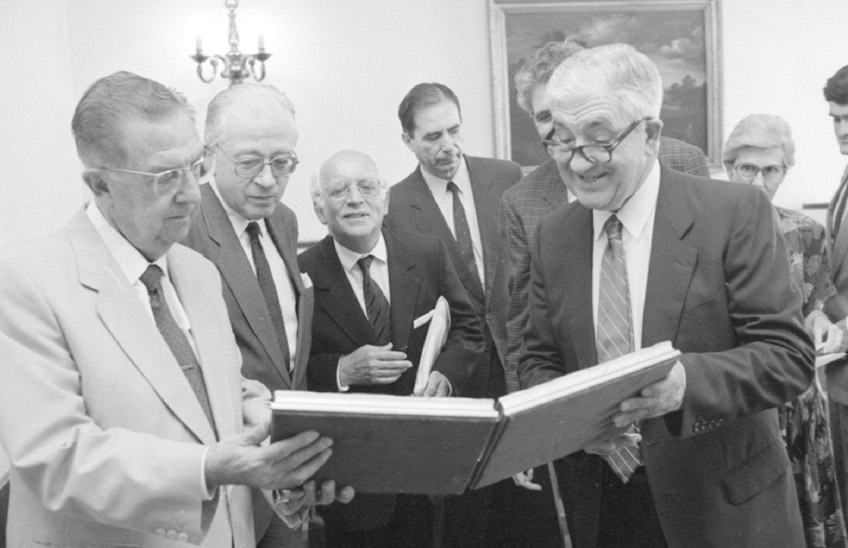27/10/2022
Published in
José Antonio Doral García
Full Professor of Civil Law of the University of Navarra
This year the University of Navarra commemorates the anniversary of 70 years of its academic history. On the same dates, Navarre celebrates 40 years of its legal regime, updated in the Organic Law of Reintegration with the signature of the agreed project . Especially between the 60s and 70s a great jurist, to whom I now refer, José María Castán Vázquez (Valencia, 1923 - Madrid, 2017), participated in the knowledge dissemination of what is commemorated in the double aspect. He recalls it in a writing entitled " Notas para la historia del degree scroll Preliminar del Código civil" (Notes for the history of the Preliminary of the Civil Code).
It contains information with a broad historical dimension, which he wrote about the preparation of the work up to the publication of the articulated text of the degree scroll Preliminary of the Civil Code. The degree scroll Preliminary covers in principle the subject that regulates, but not all the subject regulated is present and is updated in successive publications. This gives rise to the many reports. Among the works on contingencies and changes, the harmony between the legal regime established for the Spanish society in general and that of the University of Navarra, implicitly included in several topics, can be seen in detail.

It has been said of José María Castán, author of "Notas para la historia", that he is "a friend who is well loved". His empathy reveals an appealing personality. He was a lifelong friend, truthful, without arrogance, modest and kind-hearted.. Thus he is saved in the report in Spain and also outside Spain in Latin America, admired by many disciples as a teacher and writer.
In the academic world, legal comparison and communication and literary style are intertwined and interpenetrate. In this link Castán was an undisputed master. In the book tribute to José María Castán, Dr. Pérez Gallardo, Senior Associate Professor of Civil Law at the University of Havana, tells in a article that carries by degree scroll "A modo de pórtico", a brilliant report of reference letter to the past: "The spirit that sample, of opening doors underlines the interest of his lessons among the young generations of jurists".
The expression referred to moves me to a brief history lived in Navarre years ago, especially in the 60's and 70's, origin of the partnership of José María in a huge task still today of "extreme modernity". I refer to the chronicle "Notes for the history of the Reform of the Preliminary degree scroll of the Civil Code", published in 1974, the year after the promulgation of the New regional law .
The fact that two important events that bring together the professional and literary activities of José María Castán coincide in the same academic year deserves a comment. Basically, that chronicle deals with issues of legal history in which he relates in an intelligent and profound way some historical moments starring great jurists who set the course for the future in private law. The then president of the General Legislative Codification Commission, Antonio Hernández Gil, described the culmination of the task undertaken with the already published text of the Preliminary degree scroll as "the most important and important reform introduced in the Spanish Civil Code since its promulgation in 1889". Of that foreseeable scope, José María Castán Vázquez qualifies suggestive aspects that he describes with clear and precise features in the two directions indicated above: El contexto histórico del regional law Nuevo en los pasos preliminares de la Universidad de Navarra.
In ordinary life it happens that between legal channels and academic spaces friendship runs with close rapport. With José María Castán the attention among friends also manages to be prolonged. In his professional career he was an Audiencia prosecutor, a lawyer for the Ministry of Justice, secretary of the Courts Commission, secretary of the Royal Academy of Jurisprudence and Legislation. Due to his professional impulse, summary titles in one: "servant of Justice", which Gabriel García Cantero set in his questions and answers on "How to pay tribute to José María Castán Vázquez?"
The memory of Jose Maria board primarily his professional activities and family aspects. A very close repercussion in both areas of his ordinary life is centered in the University of Navarra, where his high measure is imprinted in each and every one of the above-mentioned senses. Antonio Pau, academic University Secretary, emphasizes in the obituary grade , that the main inspiration of José María was the teaching and with it the study, but as summary "happiness, which is another word core topic of José María Castán. Always a friend, always happy". This explains why these pages do not insist on an anthology as justified as it is heartfelt, nor on the subsequent synthesis of such a well-deserved homage, to which I could not attend, otherwise "unforgettable". They are limited to refer to some expressive features of his way of acting and of seeing a panoramic view from the university perspective.
|
|
|
|
Ardent was, in his own estimation, the "long series of efforts aimed at reforming the Law", a long period of work. These were truly times of creativity of the Civil Law exposed as stated in the file of the Ministry of Justice with the notes and files selected by José María. The modest study already repeated with the degree scroll "Notas para la historia" comes to be the organization of a complete book with pages open to the legality of the laws.
In the same way, he titles "Notas para la historia de la Library Services de la Real Academia de Jurisprudencia y Legislación" (1832 to 2007), with the modesty of the efficient archivist; In the careful reading of these historical notes, literary conclusions are transmitted, the good speech both in the form, essay, precise and concrete, and in the content, intelligence, systematic clarity, as the mood of an expert communicator that transmits truthful information in each and every one of the manifestations.
This roundabout abounds in such well-deserved applause and motivates the desire to focus attention on a fact subsequent to his occupations. A fact that he left printed and illuminated in some comments of file on preliminary drafts of legislative reforms. With anticipation he commemorates the event of the fortieth anniversary of the coming into force of the Organic Law of Reintegration and Improvement of the foral regime of Navarre.
In the environment, there is the stellar moment of the beginnings of the University, the presence of personalities as members of the Commissions, documents on the most important legal debates. Most of the years dedicated by José María to academic life coincide with the course of the seventy years now commemorated by the institution and those spent at the Academy of Jurisprudence and Legislation, of which he was vice-secretary and librarian. The first President of the association of Friends of the University of Navarra, José Castán Tobeñas, his father, marked the guideline of the service with such a high model height of justice and social interest, and his son, José María, projected the paternal style. It is not easy to describe in a few words the extent of the work of Castán Tobeñas in the double capacity of president of the Supreme Court and famous treatise writer, who marked the style staff enduring in the most authoritative legal doctrine in recent years.
Jose María carried out the task of reporting day by day on the reform of the preliminary degree scroll of the Civil Code with enthusiasm and effort. Work that, according to his own statement, had to be "interrupted and resumed over decades". As result of the final goal confirms in the repeated Notes its usefulness. He offers there a set of facts and data "that can offer a clue for more important works or offer a small contribution to the work done". It is the generosity core topic of knowledge and guideline of the path to follow the official document of the Law (ars iuris) with the good laws that are kept until today. To legislate better the text and the content of the new laws is a mandate that can be imposed.

From left to right, José María Castán, José Antonio Doral and José María Bastero.
Finally, it is clear from a careful reading of the repeated "notes" that José María Castán has been the first historian analyzing the update of the foral law in force until Navarre became an autonomous community, with the closure of the old saying "for now", and his precise mentions point out decisive points in the official route of the University simultaneous to the promulgation of the regional law Nuevo until the Decree-Law agreed in 1979, between Cortes and Parliament with the progressive update or single reading of the institutions.
With the final repeal of the law paccionada in 1981, the laws of the family ceased to be dispositive, and the area of the skill in subject enters in the uniformista baraúnda. His theological and literary defense of the true family autonomy, the one that deserves attention by the Law, is qualified in his programs of study of Family Law with expressive themes of deep meditation in the solid training received by religious and cultural inheritance. The concern already appears among the important themes of work , which are indeed those that require the utmost effort of successive generations. One of his most recent papers "La regulación histórica del matrimonio en España" (Madrid 2005) is a critical reflection, predominantly juridical, of the reform of Family Law in the Civil Code that was made in 1981 under the protection of the 1978 Constitution. La crónica de una vida universitaria de una promoción de Derecho (1940-45), Revista de la School de Derecho de la Universidad Complutense 86 (1996) is a meritorious work ,
To conclude, there are only words of particular gratitude to express the impulse received by his way of acting with joy and freedom, the affectionate financial aid with accredited specialization to the "friend of friends". Among them were the first professors, some of them even before the General Study began its work. The foundational stage updates the history of the University of Navarra. The stages between update of texts and reform of the content are contemporary (1973-1974). What is now evoked and commemorated as a historical expression is the harmony, the course of history, referring to the modifications and improvements in each historical moment, clearing out what is in the way.


